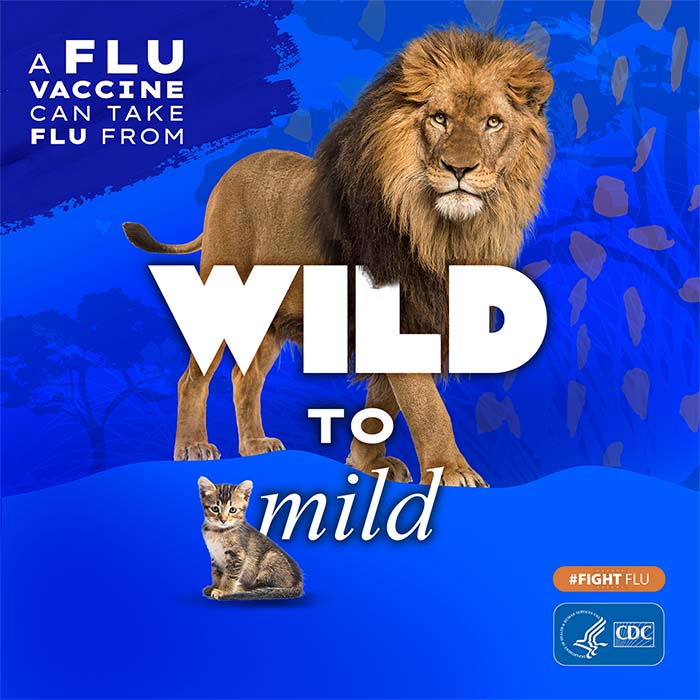Get Vaccinated to Fight Flu
The best step you can take to prevent influenza (flu) and its potentially serious complications is getting a yearly flu vaccine.

Flu Vaccine Benefits:
While flu vaccines vary in how well they work, flu vaccination is the best way to prevent flu and its potentially serious complications.
- Flu vaccines prevent millions of illnesses, tens of thousands of hospitalizations and thousands of deaths every season.
- Flu vaccines are safe. Hundreds of millions of flu vaccines have been safely given to Americans for more than 50 years.
-
Vaccination helps protect women during and after pregnancy. A CDC multi-year, multi-country study showed it reduced the risk of flu hospitalization among pregnant women by 40% on average. Flu vaccination during pregnancy also helps protects babies from flu for the first several months after birth when they are too young to be vaccinatedFlu vaccination can lower the risk of serious outcomes from heart disease and diabetes.
- Getting vaccinated yourself may also protect people around you, including those who are more vulnerable to serious flu illness, like babies and young children, older people, and people with certain chronic health conditions.
- While some people who get vaccinated do still get sick, there is a growing amount of data showing that vaccination makes illness less severe, helping to prevent serious outcomes.
For more information, visit What are the benefits of flu vaccination?
- Children younger than 5, but especially younger than 2 years old;
- People 65 and older;
- People with asthma, heart disease, chronic lung disease, and neurological and neurodevelopmental conditions;
- People with blood, kidney, liver, endocrine, and metabolic disorders, including diabetes mellitus;
- People who have a weakened immune system due to disease or medication;
- Pregnant women and women up to two weeks postpartum;
- Residents of nursing homes and other long-term care facilities.
For the full list of high-risk conditions, visit People at High Risk of Developing Flu-Related Complications.
What flu vaccines are available this season?
For the 2019-2020 flu season, options include:
- Standard dose flu shots. These are given into the muscle. They are usually injected with a needle, but one (Alfluria Quadrivalent) can be given to some people (those aged 18 through 64 years) with a jet injector.
- High-dose shots for older people.
- Shots made with adjuvant for older people.
- Shots made with virus grown in cell culture.
- Shots made using a vaccine production technology (recombinant vaccine) that does not require the use of flu virus for adults 18 years and older.
- Live attenuated influenza vaccine (LAIV) – or the nasal spray vaccine – is approved for use in non-pregnant individuals, 2 years through 49 years of age. There is a precaution against the use of nasal spray flu vaccine in people with underlying medical conditions.
CDC and its Advisory Committee on Immunization Practices (ACIP) recommend providers use any licensed, age-appropriate flu vaccine with no preference for one vaccine over another.
Where to Get Vaccinated:
Flu vaccines are offered in many locations, including doctor’s offices, clinics, health departments, pharmacies, and college health centers, as well as by many employers, and even in some schools. To find flu vaccine in your area, use the HealthMap Vaccine Finder.

